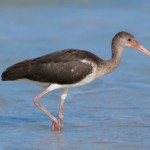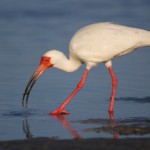A big, tough guy is guiding us through swamps in the Everglades. He points out some White Ibises, but they’re not white.
“That’s because they’re juveniles,” he says.
This is correct. He had no way of knowing that we already knew that, because, c’mon, it’s not the kind of thing most people know.
Most people don’t know an Ibis from their elbow. And they’d call it a stork anyway.
The word “juvenile” sounded funny coming from this tattooed bruiser. But he had it right.
This brought up thoughts of life cycles. We’re all just walking life-cycles. Ibises. People. Anything that can have a biography.
(Biographies are fascinating books, yet can be downers, too. This is because you know the demise of the subject before he or she knows it).
Anyway…
Yeah, we’re all walking life cycles. Babies get born, kids grow up, young turns old, old turns really old.
Hell, it’s good to get away from these sobering realities.
One great way to do this is to lose yourself for a while in a wild place.
Like the Everglades. But then, there’s this guy talking about juvenile Ibises.
You start thinking about how they’ll become mature soon enough, with mature plumage.
They’ll hook up with hot Ibises of the opposite sex, make more juvenile Ibises, then fade into the sunset.
The juveniles we just saw will start the cycle all over again, and it’ll keep going.
On the garbage can near the trailhead, there’s a sign that says, “please recycle.” Ibises got the message. We all got that message.



Here is some fairly useless info……Ancient Egyptians paid special attention to the organs of their dead, embalming them so they would continue to function in the afterlife. Now it seems they did the same for sacrificed ibis birds, and even packed their stomachs with food so they wouldn’t go hungry.
Ibis mummies are found in their millions at shrines in Egypt, where they were sacrificed to Thoth, the god of writing and wisdom.
There are so many bird species out there. I would encourage people to get a good bird book and set of binoculars.
The city’s not the Everglades, but it’s wild. Here’s a quick comment about my 2-fisted 2-year-old: Today I woke up at 7am to give her some milk. As I do almost every morning. But this morning we were out of milk. So we got bundled up for a walk to the corner store. There were lots of little birds on the sidewalk, bouncing around. I said, look, there’s a bunch of House Finches! And then she said “House Sparrows.” She was right.
Maryanne, in between hanging around in the wild, yeah, there have been biographies. Several about T. Roosevelt; then J. Kennedy, B. Franklin, H. Stanley, Einstein (funny, that guy needs no initial), J.J. Audubon, many others…anyway…every time, you get the idea that you’re watching the subject play out a life with earnest action, intentions, ups and downs, and the person’s hoping for the best, taking leaps of faith, all the things people do…and all the while, you, the reader know the end of the story. You know it even before you start. So, there’s the aspect of this being something of a downer, sometimes, as mentioned in the post. Still, I like biographies, and am about to start S. Jobs new one. Hey, another example…
As an avid reader of biographies, I was interested that you mentioned them. They are life cycles, and that’s a good point. But I never thought of them as “downers” as you say. Interesting.
l’m the guy who doesn’t know an ibis from an elbow. Now I know a juvenile ibis from an elbow. keep the news flying, two-fisted birdman.
This gives new slant on looking at the word RECYCLE. I see this on garbage cans all time and never occurred to me that it meant something more. thanks for the new idea. I’ll never look at recycle quite the same.
Pat